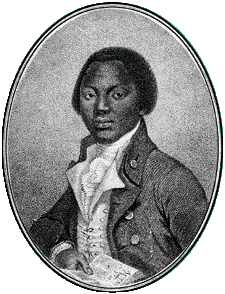
Where Was Olaudah Equiano Born?
(And Why Does It Matter?)
Equiano's autobiography, The Interesting Narrative of the Life of Olaudah Equiano, or Gustavus Vassa, the African,
published in 1789, is important for many reasons. It is one of the very
few texts written in English by a person of African descent during the
eighteenth century. It is also one of the first accounts of a journey up
from slavery written by one who had personally experienced enslavement.
This makes it one of the earliest 'slave narratives'. But is more than
merely an account of what it was like to be a slave. In the book,
Equiano gives a long and detailed description of life in an African
village - the earliest such description in the English language - as
well as offering a first-person account of 'the middle passage'
- the journey from Africa to America in a slave ship. These were all
important parts of a book that appeared in 1789; the year in which the
British parliament first seriously debated abolishing the slave trade.
(Indeed, we can see The Interesting Narrative as a document of
that debate.) Yet they are also significant to this day. Equiano's
description of African society is the most important written by an
African in the days before European empires severely disrupted African
society. And Equiano's description of the middle passage is a reminder
of the sufferings of the ancestors of most African American and Black
British people alive today. In 1999, however, it was suggested by
Vincent Carretta that Equiano may not have been born in Africa but,
rather, as a slave in South Carolina. - at that time one of the
thirteen British colonies in North America. In addition, Carretta argues
that the early parts of Equiano's autobiography, rather than recording
first-hand experience, may reflect the oral history of other slaves,
combined with information Equiano gleaned from books he had read about
Africa. Carretta's evidence, a baptismal record and a muster roll, is
compelling. It strongly suggests that the young Equiano told people that
his birthplace was South Carolina. Yet this evidence doesn't seem to be
quite enough to settle the matter, and historians and critics are
divided on the question. On this page, I offer (I hope) both sides of
the argument, and leave it to you to make your own mind up. In the
column on the left, I have put arguments to suport the view that Equiano
was born in Carolina. In the column to the right, I have put arguments
to suggest that he was born in Africa.


No comments:
Post a Comment